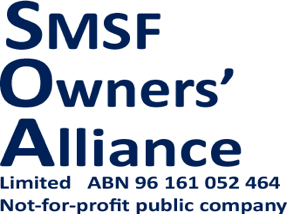Last November 2015, the SMSF Owners’ Alliance, put out a media release regarding the Grattan Institute’s attitude to superannuation. In view of Grace Collier’s article in the Weekend Australian (20-21 August 2016, page 22) “Leftie think tank behind super grab – Why should Coalition policy be based on the Grattan Institute’s recommendations?”, Save Our Super thinks it is timely to revisit the SMSF Owners’ Alliance media release.
25 November 2015

An $11,000 cap on concessional contributions, as proposed by the Grattan lnstitute, would confine superannuation to being merely a substitute for the age pension rather than a vehicle for increasing savings for individuals and the nation.
This narrow approach defeats the purpose of superannuation. lf people can only save enough for retirement to be a bit better off than the pension then, rationally, they will spend their retirement savings as fast as they can and go on the pension. Where is the incentive to save more and be financially independent?
This is not the way to grow Australia’s retirement savings and give everyone the chance to live comfortably at a level related to their pre-retirement income, a concept known to economists as the ‘reasonable replacement rate’. This is generally accepted to be around two-thirds of pre-retirement income.
Grattan’s plan would throttle retirement savings and condemn millions of Australians to spend the last years of their lives in genteel poverty. Grattan quotes ASFA’s estimate that a retired couple need super savings of $640,000 for an “affluent lifestyle”. At a 5% return, that would give couples an income of $32,000 – hardly affluent.
It doesn’t allow for unexpected costs, such as surgery, house repairs or other necessities, that will run down fund balances. Nor does it allow for the likely high costs of care at the end of life which will have to be met by the taxpayer if people can’t afford to pay for themselves from their retirement savings.
As the Financial System Inquiry (FSl) noted, the biggest fear older people have is that their savings will not last all their lives. We suspect that Grattan really doesn’t like the idea of superannuation at all and would prefer everyone to be on the taxpayer funded age pension. Remember that when Labor announced their policy to tax super earnings above $75,000, Grattan said the limit should be $20,000 – about the same as the age pension. So in their view any income from savings above the age pension level should be taxed.
Superannuation is not a welfare system. lt is a retirement savings system that delivers important social and economic benefits to the nation. Grattan doesn’t see this distinction and seems to regard superannuation as a social engineering tool like the welfare system.
lf Grattan gets their way, Australia’s savings pool will be drained. There will be less money going into superannuation, less investment and fewer jobs – not least in the superannuation ‘industry’ itself. The corporations that back Grattan should think about this.
The Grattan Report repeats a couple of well-worn fallacies.
First, that the majority of superannuation tax concessions go to high income earners. Yes, they do, but high income earners pay proportionally more in income tax than they receive in concessions.
Grattan, and others, should acknowledge that higher income earners pay more tax. The Government’s ‘Better Tax’ website points out that the one third of taxpayers on incomes above $80,000 pay two thirds of income tax while the two thirds of taxpayers on incomes below $80,000 pay one third. ATO stats show that the top 20% of income earners pay 64% of income tax collected.
Second, Grattan comes up with a $25 billion cost to the budget of superannuation tax concessions. At least this is different to the usual $32 billion claim and moving in the right direction but it is just as flaky. As the Parliamentary Tax & Revenue Committee has been hearing, these numbers are not valid and even Treasury doesn’t stand by them.
Besides, mismanagement of the budget is not a reason to cut back on incentives for retirement savings. Governments need to get their real spending under control.
SMSF Owners believe the superannuation system is generally working well but can be improved. One way is to change the taxation of contributions. lnstead of everyone paying the same flat tax on contributions, there should be a flat (equal) tax benefit for everyone in the form of a rebate for super contributions keyed off an individual’s marginal income tax rate. This is the concept advanced in the Henry tax review five years ago, supported in principle by SMSF Owners in our Tax White Paper submissions and recently advocated by Deloitte Access Economics.
On our proposal, adjusting the front end taxation of contributions would allow the removal of taxes on fund earnings without affecting government revenue and boost tax-free retirement incomes so Australians can afford a comfortable and care free retirement. This would inspire Australians to save as much as they can, not as much as Grattan thinks they should.
lf there are to be changes made to the taxation of superannuation then they should be considered in the context of the whole tax system, including Australia’s highly progressive income tax rates. This is the outcome we are expecting from the current White Paper process which should deliver lower, simpler and fairer taxes for everyone.
Contact:
Duncan Fairweather
Executive Director
SMSF Owners
o4L2256200
dfairweather@smsfoa.org.au
www.smsfoa.org.au

